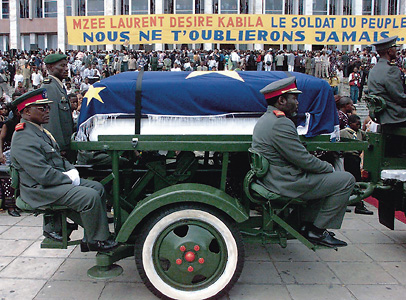Kabila, Laurent Désiré, << kah BEE luh, law RAHN day zee RAY >> (1939-2001), was president of the Democratic Republic of the Congo (DRC) from 1997 until his death in 2001. He became president after ousting the long-time dictator Mobutu Sese Seko. Kabila had fought for more than 30 years against Mobutu. Kabila was shot by one of his bodyguards on Jan. 16, 2001, and died later from his wounds. He was succeeded as president by his son Joseph.

Kabila was born on Nov. 27, 1939, in Katanga Province in the southern part of what was then a colony called the Belgian Congo. He studied in France and Tanzania. After Congo won its independence from Belgium in 1960, Kabila served as a youth leader of a party allied with the country’s first prime minister, Patrice Lumumba. Months after taking office, Lumumba was ousted by the military and later assassinated. In 1964, Kabila led an unsuccessful revolt against the government. In 1965, the Congolese Army, led by Mobutu, seized control of the government. Mobutu became president. The country was renamed Zaire in 1971.
In 1967, Kabila founded the Marxist People’s Revolutionary Party (PRP). In the 1970’s, the party set up an independent zone in the eastern DRC. Kabila later spent time in Tanzania.
In 1996, Kabila emerged as the leader and organizer of another revolt against Mobutu by Tutsi people in eastern Zaire and other opponents of Mobutu. This rebellion grew into a nationwide revolt that toppled Mobutu. Kabila called his movement the Alliance of Democratic Forces for the Liberation of Congo-Zaire (ADFL). Upon taking power in May 1997, Kabila renamed the country the Democratic Republic of the Congo.
In August 1998, an uprising against Kabila’s government began in eastern Congo. The rebels were backed by troops from Rwanda and Uganda. Forces from Angola, Namibia, and Zimbabwe fought on the side of Kabila. In 1999, a cease-fire agreement was signed by Congo, the other countries involved in the war, and the two rebel groups fighting the Kabila government. However, the agreement was violated by all the countries and rebel groups. A series of agreements signed in 2002, after Kabila’s death, finally put an end to most of the fighting.
